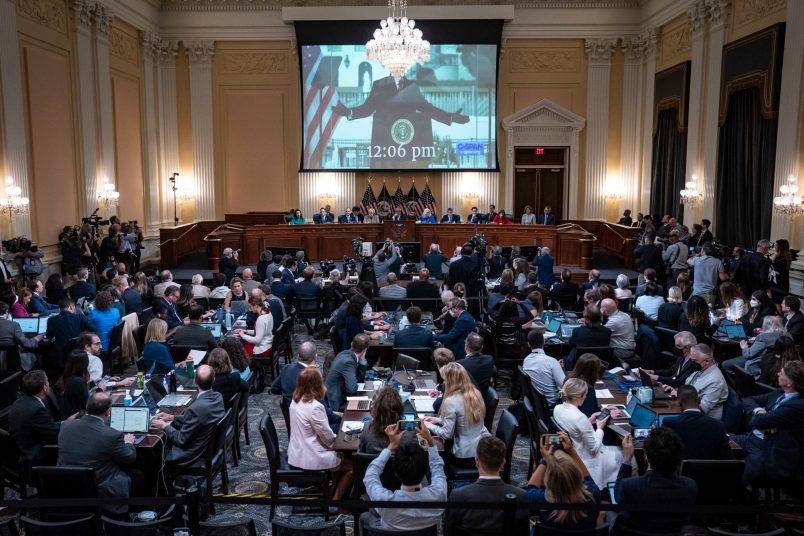The Jan.6 Committee’s hearing last night was full of newsworthy information: The committee made clear that it views Trump’s effort to steal power as a months-long, wide-ranging conspiracy. And they said they’ve collected evidence indicating Trump and his inner circle knew they’d lost the election, and nonetheless went forward with the election theft attempt anyway.
But we have plenty of hearings left to go. And we have plenty of questions left to answer. Here are some big ones:
What was Trump doing for hours as the attack unfolded?
The committee clearly views Trump’s refusal to step in for hours on Jan. 6 as an important point: It’s the last part of what they say was Trump’s seven-part plan to steal power.
And they’ve hinted that they know a bit about what he was doing: In response to rioters’ chants of “Hang Mike Pence!” the committee alleged that Trump signaled his agreement with that sentiment, saying “maybe our supporters have the right idea — Mike Pence deserves it.”
But it seems they’re saving their powder for the final hearing — when Vice Chair Liz Cheney (R-WY) promised “a moment-by-moment account of the hours-long attack from more than a half dozen White House staff, both live in the hearing room and via videotaped testimony.”
What did these staffers observe? Did Trump knowingly allow the attack to continue with the hope that the election would be overturned? How did he express his view that perhaps Pence “deserved” to be executed?
Which members of Congress sought pardons?
Cheney said at one point that Rep. Scott Perry (R-PA) and “multiple other Republican congressmen” tried to obtain “presidential pardons for their roles in attempting to overturn the 2020 election.”
Wait, what?!
Perry was one of five Republican members of Congress subpoenaed for testimony by the committee on May 12, along with House Minority Leader Kevin McCarthy (R-CA) and Reps. Jim Jordan (R-OH), Mo Brooks (R-AL), and Andy Biggs (R-AZ).
Perry, who was steeped in conspiracy theories about the 2020 and pushed the White House to pursue them, was reportedly involved in a plan to replace the acting attorney general with Jeffrey Clark, who was set to publicly proclaim issues with the 2020 election.
Who else sought Trump pardons? We want to know.
Did Trump’s inner circle plot with right-wing militias?
We know already that Trump coordinated openly with violent right-wingers: That is, he beckoned his supporters to the Capitol on Jan. 6, told them it would be a “wild” time, knew that they included violent right-wing fanatics, and then sicced them on Congress.
But was there more going on behind the scenes? Oath Keepers Leader Stewart Rhodes appeared to believe he could get in touch with Trump through an intermediary in the President’s circle, and members of the organization were part of Roger Stone’s security detail. But did it go further than that?
Describing the Proud Boys’ movements at the forefront of the Jan. 6 attack on Thursday night, Committee Chair Bennie Thompson (D-MS) said, “What you witnessed is what a coordinated and planned effort would look like. It was the culmination of a months-long effort spearheaded by President Trump.”
Are there non-public communications about which only the committee knows?
How much investigatory meat has the committee added to the bones of Trump’s plan?
From the early days after the Jan. 6 attack, it was clear to us at TPM and, eventually, to other outlets that the attack was part of a multi-front campaign to subvert democracy. And the committee made clear it had the same view by articulating a “seven-part plan” that it said Trump followed to steal a second term.
The question now is: Who do you have on record? What new information do you have about Trump’s personal involvement in each of these steps: We know, for example, that Trump tweeted publicly about Mike Pence and harassed him to overturn the election results. But what was the true scope of this effort on Trump’s part?
The opening night of hearings was promising in this respect: We saw video-taped testimony from top Pence aide Marc Short, as well as other high-profile witnesses that spoke to several other bullets on the seven-point list, like Trump spokesperson Jason Miller and Chairman of the Joint Chiefs of Staff Mark Milley. Unlike at the start of the impeachment proceedings over the Capitol attack, Trump is now out of power, and it appears several key players did in fact participate in committee depositions. How deep was the committee able to go?



